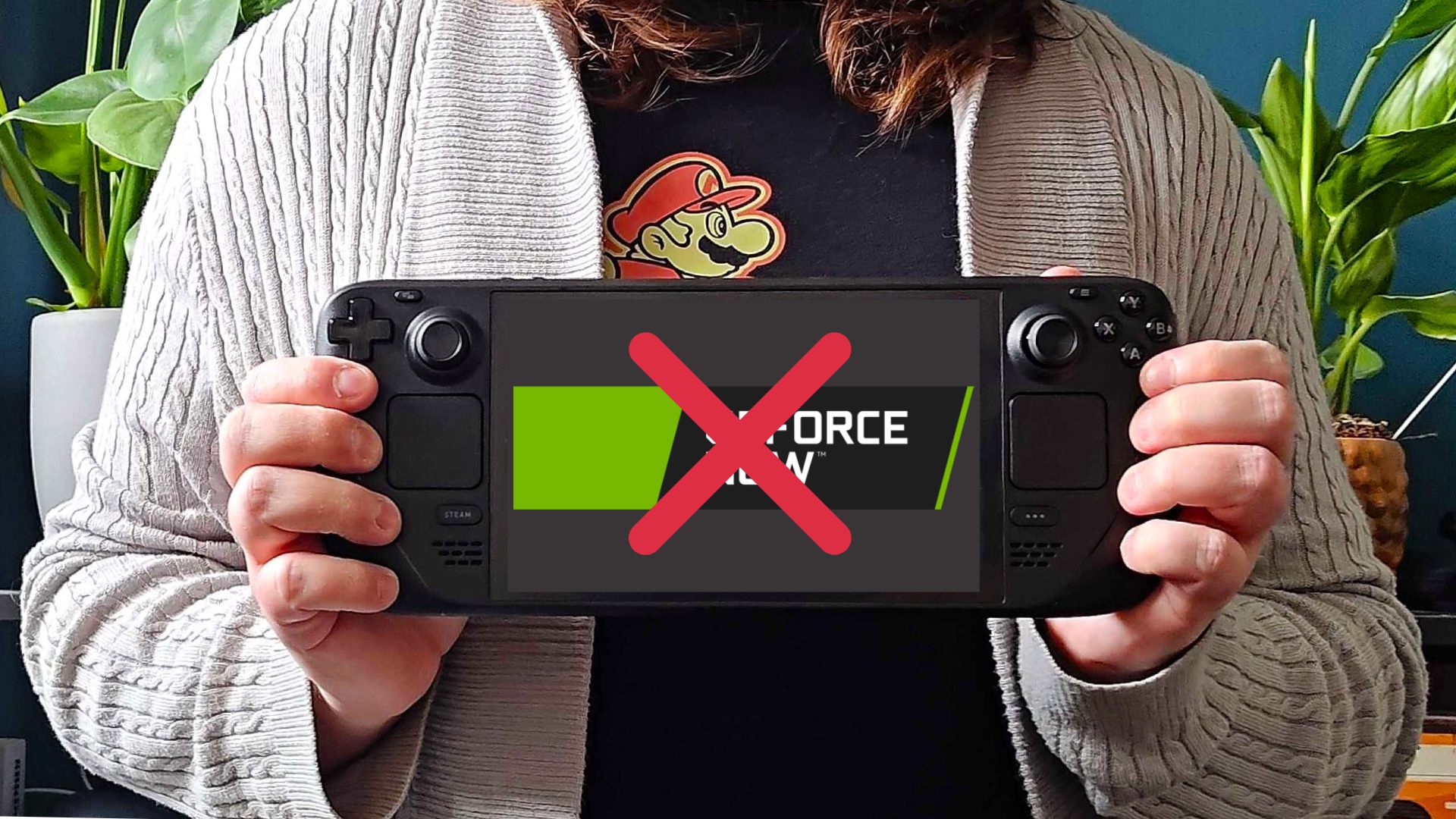Nvidia might be making its own Steam Deck rival, but I’m praying the handheld isn’t powered by GeForce Now
Dear Nvidia, please keep your head out the clouds.

The idea of Nvidia making its own gaming handheld to rival the Steam Deck isn’t surprising. Nor would it be a bad idea considering the GPU tricks it has up its sleeve, but we don’t yet know whether it’ll have more in common with your graphics card or a streaming device designed to link up to GeForce Now. As someone who regularly tests new portable devices, I really hope that the latter doesn’t happen, as the company could contribute far more to the scene than cloud tech.
There are more than a few best gaming handheld contenders to choose from right now, with many offering a slightly different way to access PC games. In one camp, you have the likes of the Steam Deck OLED and Asus ROG Ally, both designed to run games natively using capable AMD APU graphics solutions. In the other lives cloud streaming devices like the Logitech G Cloud and Razer Edge, which rely on services like Nvidia GeForce Now and Xbox Game Pass to run games using dedicated servers.
So, where does Nvidia come into things? Well, according to reliable tech leaker Moore's Law is Dead, the graphics card giant is “getting serious about making more handheld gaming devices with their graphics IP.” The green team apparently “is not happy that AMD has a successful Steam Deck out there” and could potentially end up powering a so-called PlayStation Vita 2.
The YouTuber claims Nvidia is interested in working with someone on a “premium handheld gaming device,” and says it may even end up working with Intel, with the caveat being that it’d be “years from now.” So, don’t hold your breath for an imminent Steam Deck rival with a GeForce GPU inside any time soon.
That said, we will more than likely end up with a Nintendo Switch 2 with an Nvidia T239 graphics chip within. And, while MLID touches on the idea of Nvidia wanting to avoid it seeming like “every console uses AMD, except for the weakest one,” including features like DLSS in the sequel handheld would make for a nice way to set the stage.
Please don’t stick your head in the GeForce clouds
As usual, I want to reiterate that the above Nvidia gaming handheld rumors are anything but an official confirmation. Keeping the usual grain of salt to hand is heavily advised, but the whispers do provide some confidence when it comes to what such a portable device would look like. It’s hard to imagine a “premium” device designed to take on AMD using GeForce Now, and I reckon we’re more likely to see a mobile RTX 4060 end up inside a Steam Deck-shaped device.
I don’t remotely think Nvidia is done with trying to sell the idea of GeForce Now, and I guess that’s what gets me nervous when it comes to handheld chat. For gaming to ascend into the clouds and remove the need for native hardware, we realistically would need widespread access to high-speed internet, which feels like it should be an established thing in this day and age, but absolutely isn’t. Admittedly, the future could be bright and full of broadband delights, enabling companies to try and get you on board with streaming your games with a straight face.
Sign up to the GamesRadar+ Newsletter
Weekly digests, tales from the communities you love, and more
However, I’m hopeful that Nvidia realizes that’s more of a long-term ambition than something to gun for right now, and it’s certainly not the key to competing with AMD. Ultimately, catering more to the handheld market with mobile chips that already exist is the key to success, with the result hopefully being a device that can rip through the latest games using Frame Generation to outpace all its competitors in terms of fps.
Looking for a solution with more power? Check out the best gaming laptop and gaming PC builds for a selection of high spec systems. Alternatively, swing by the best Steam Deck dock for ways to turn Valve's handheld into a hybrid.

I’ve been messing around with PCs, video game consoles, and tech since before I could speak. Don’t get me wrong, I kickstarted my relationship with technology by jamming a Hot Wheels double-decker bus into my parent’s VCR, but we all have to start somewhere. I even somehow managed to become a walking, talking buyer’s guide at my teenage supermarket job, which helped me accept my career fate. So, rather than try to realise my musician dreams, or see out my University degree, I started running my own retro pop culture site and writing about video games and tech for the likes of TechRadar, The Daily Star, and the BBC before eventually ending up with a job covering graphics card shenanigans at PCGamesN. Now, I’m your friendly neighbourhood Hardware Editor at GamesRadar, and it’s my job to make sure you can kick butt in all your favourite games using the best gaming hardware, whether you’re a sucker for handhelds like the Steam Deck and Nintendo Switch or a hardcore gaming PC enthusiast.


